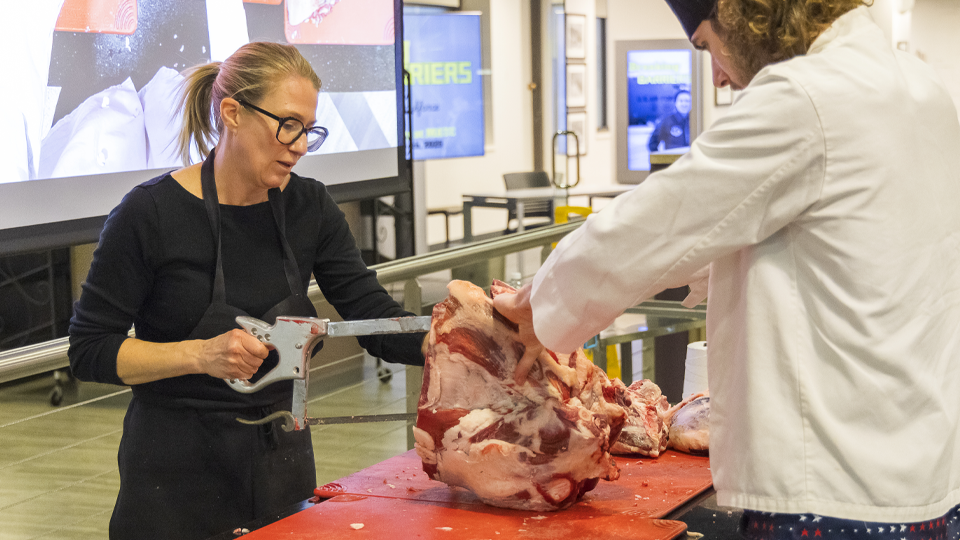Culinary Arts graduate, Milwaukee restaurant owner and skilled butcher Karen Bell has carved out an impressive career

MATC Culinary Arts students watched as Karen Bell expertly butchered a 70-pound lamb.
Karen Bell demonstrates how to cut through a lamb
Karen Bell tightly gripped the knife, its scalpel-sharp blade glinting in the light.
She moved forward and thrusted. She did it again, and again, slicing the knife through the flesh and the fat.
Then Bell picked up a handsaw. She found a spot, braced herself and rocked the blade back and fourth, sawing through bone. When she finished, she was sweating and short of breath. But she smiled at her handiwork.
And more than a 100 people applauded.
Bell, a graduate of MATC's Culinary Arts program and a classically trained butcher, had just finished cutting and carving a 70-pound lamb into an appetizing assortment of chops, shanks, roasts, and steaks.
"Ever since I have been doing this, I have loved it." said Bell, a nationally recognized chef who owns Bavette La Boucherie, a restaurant and provisions store in Milwaukee's Third Ward neighborhood. "You start with one thing and you end up with all sorts of other things. It's very gratifying."
In March, Bell demonstrated her considerable butchering skills at her alma mater. Nearly 100 Culinary Arts students and faculty watched Bell artfully slice away while explaining her methods and answering questions about her impressive career.

Karen demonstrates how to cut a lamb in front of students
Old-War Craft
A native of Whitefish Bay, Bell was 15 when she started working as a waitress at Heinemann’s, a legendary restaurant chain in the Milwaukee area. After graduating from MATC in 1998, she studied at Le Cordon Bleu in Paris and then moved to Chicago, where she worked as head line cook at Vong Restaurant and as a pastry cook at prestigious Charlie Trotter’s.
And, Bell learned about the butcher business. “I was interested in what many people thought was a dying craft,” she told the crowd at MATC.
She watched other butchers, including an old-world artisan from Germany. She read books, watched videos and tried things out for herself. “I was always learning,” she said. “Even when I opened a restaurant, I was always learning new things.”
She headed cross-country and worked as a sous chef at San Francisco’s Farallon for three years. “I was pretty burned out, and I needed a life change — maybe even a career change,” Bell told Milwaukee restaurant writer Lois Fredrich in 2014. “So, I decided I wanted to spend some time abroad.”
In 2003, she ventured to Madrid, Spain, with her sister. This was their plan: teach English and explore the culture and countryside. But Bell’s teaching gig fell through. Then she heard about an American with a restaurant in Madrid and that inspired her to get cooking again.
“People kept telling me about this American who owned a restaurant and how I should check it out,” she told Fredrich. “So, after a few weeks, with money dwindling quickly, I went back to the kitchen.”
She eventually opened a California-inspired restaurant called Memento.
With only seven tables and a tiny kitchen, the small restaurant had a big impact on Bell’s future.
“It renewed my passion for cooking,” she told Fredrich. “I’d always worked in large fine dining restaurants, and this was small and hands-on. I went to the market. I prepped. I did dishes. And after a year came and went, I didn’t feel I’d had enough time. I wanted to stay and continue the process of learning the language and immersing myself in the culture.”
I had the mentality that I can do whatever they're doing — that I can do it better and that I'll show them.
Coming Home
The restaurant was a success, but after six years in Madrid, Bell decided to come back to the Midwest. In 2013, she opened Bavette, a modern take on an old-time butcher shop that included a restaurant.
In 2018, she was a finalist for the prestigious James Beard Foundation award for best chef in the Midwest. She also has been a semifinalist in 2017, 2019 and 2020.
Bell accomplished all that in a mostly male field: In 2023, only 28% of all butchers and meat, poultry and fish processing workers in the United States were women, according to the federal Bureau of Labor Statistics.
“Being a woman in this industry has never been a challenge for me,” she said. “I’ve always been a person who is going to do what they’re going to do. Having my own place helps. It’s more of a challenge being a mom. Time has become more precious.”
She added, “I feel pretty fortunate that I have had the experience I have had. I had the mentality that I can do whatever they’re doing — that I can do it better and that I’ll show them.”
The total number of butchers in the United States is projected to decline in the next decade, labor statistics showed, but there will be job openings as older butchers retire or leave the field.
“Hard work and hard work,” said Bell when asked how to succeed in the culinary business. “Being flexible. You need to stay your course and stay true to your core values, but also be ready and willing to change. Maybe some luck.”
She added, “You need to love it or really, really enjoy it. For me, every day is a challenge, but that’s why I love what I do.”

Karen is teaching students on how to cut Lamb and other meats.

